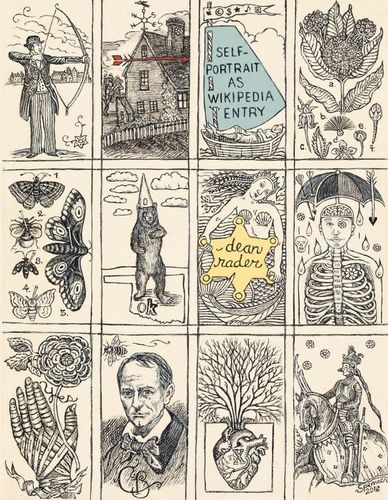|
· Reviews in The Rumpus, San Francisco Chronicle, Publisher's Weekly, San Jose Mercury News and more
· Amazon Page · Copper Canyon catalogue page · Notes to some of the poems from the book · Notes on Marnie Spencer's cover + the artworks the poems address _______________________________________ |
s e l f - p o r t r a i t a s w i k i p e d i a e n t r y
|

Called “dynamic” by Booklist and “ingenious” by The San Francisco Chronicle, Rader’s book is an innovative collection of poems that merge traditional and experimental forms. Thematically, the poems interrogate three main concepts—aesthetics, identity, and America—and how they triangulate on both the personal and national levels. Rader asks a series of questions about the very issues America is currently grappling with, including identity, politics, race, gun violence, labor, and economic class. One topic he returns to throughout the book is the relationship between selfhood and nationhood. To what degree, the poems query, is the self colored with and by and the same palette that colors the nation?
Indeed, in a series of poems entitled "American Self-Portrait" and "American Allegory," Rader explores whether one's identity can ever be fully separate from the identity of one's country. Rader is also interested in the relationship between aesthetic expression and social commentary. In a series of poems about and in response to the work of Paul Klee, Hieronymus Bosch, Sesshu Toyo, Pablo Neruda, LeAnne Howe, and Langston Hughes, Rader asks what the role of art is in making a nation, a culture, and a future.
All of these questions lead to what we do in an era of uncertainty, of post-truth, of Wikipedia versions of knowledge and reality. In their review of Self-Portrait as Wikipedia Entry, Publisher's Weekly writes, "few poets capture the contradictions of our national life with as much sensitivity or keenness."
Among the celebrated poems in this innovative collection are the award-winning "Still-Life with Gratitude" and two other widely circulated pieces: "Self-Portrait in Charleston, Orlando," which appeared as an Academy of American Poets Poem-A-Day and "America, I Do Not Call Your Name Without Hope," which ran in The San Francisco Chronicle immediately following the November 8 presidential election and currently appears in a half-dozen post-election anthologies.
In 2015, a portfolio of poems from the book won the George H. Bogin Award (judged by Stephanie Burt) from the Poetry Society of America, given for poems "that use language in an original way to reflect the encounter of the ordinary and the extraordinary and to take a stand against oppression in its many forms." Burt writes of Rader’s work: “We need a poetry that can present both the attractiveness, and the sad ridiculousness, of the future in "American Self-Portrait," where the takers, the killers, the colonizers of Oklahoma—or Maryland or Massachusetts—reverse history and give everything back. If that's not possible, then what is possible, for Norman, Oklahoma; for Peter Norman; for "us"? We don't know. But this poet can help us find out.”
Indeed, in a series of poems entitled "American Self-Portrait" and "American Allegory," Rader explores whether one's identity can ever be fully separate from the identity of one's country. Rader is also interested in the relationship between aesthetic expression and social commentary. In a series of poems about and in response to the work of Paul Klee, Hieronymus Bosch, Sesshu Toyo, Pablo Neruda, LeAnne Howe, and Langston Hughes, Rader asks what the role of art is in making a nation, a culture, and a future.
All of these questions lead to what we do in an era of uncertainty, of post-truth, of Wikipedia versions of knowledge and reality. In their review of Self-Portrait as Wikipedia Entry, Publisher's Weekly writes, "few poets capture the contradictions of our national life with as much sensitivity or keenness."
Among the celebrated poems in this innovative collection are the award-winning "Still-Life with Gratitude" and two other widely circulated pieces: "Self-Portrait in Charleston, Orlando," which appeared as an Academy of American Poets Poem-A-Day and "America, I Do Not Call Your Name Without Hope," which ran in The San Francisco Chronicle immediately following the November 8 presidential election and currently appears in a half-dozen post-election anthologies.
In 2015, a portfolio of poems from the book won the George H. Bogin Award (judged by Stephanie Burt) from the Poetry Society of America, given for poems "that use language in an original way to reflect the encounter of the ordinary and the extraordinary and to take a stand against oppression in its many forms." Burt writes of Rader’s work: “We need a poetry that can present both the attractiveness, and the sad ridiculousness, of the future in "American Self-Portrait," where the takers, the killers, the colonizers of Oklahoma—or Maryland or Massachusetts—reverse history and give everything back. If that's not possible, then what is possible, for Norman, Oklahoma; for Peter Norman; for "us"? We don't know. But this poet can help us find out.”